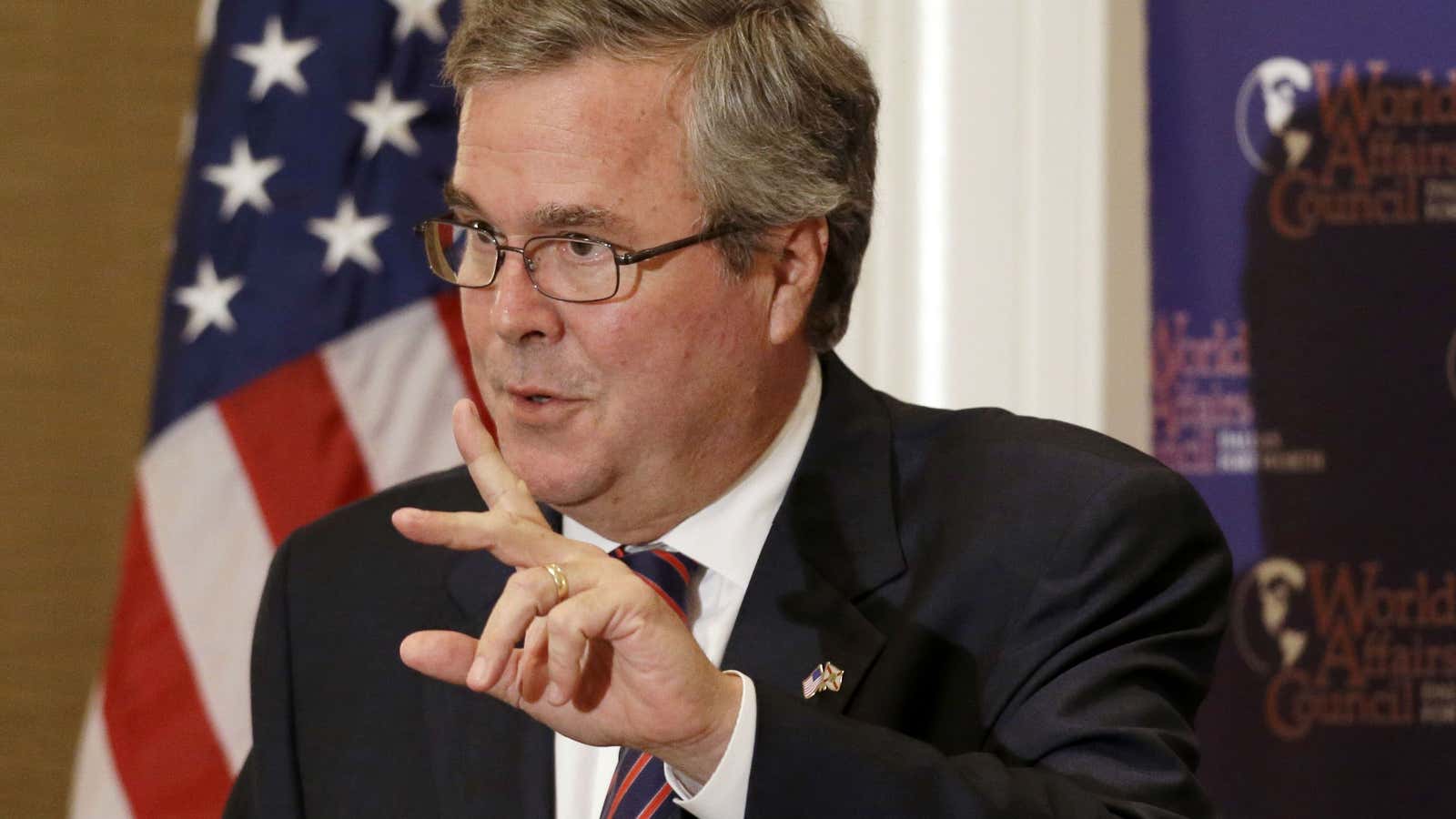When asked last year about the prospect of her son Jeb running for president, former first lady Barbara Bush responded that “…we’ve had enough Bushes.”
Apparently not.
On Dec. 16, former Florida governor Jeb Bush announced that he was “actively exploring” running for president, becoming the highest profile Republican to make such an announcement about 2016.
Jeb is now the favorite of “establishment” Republicans hoping for a more moderate standard-bearer to face off with likely Democratic nominee Hillary Clinton.
If he were to win, Jeb would restore the reign of one of the great dynasties in American politics. Their line reaches back from Jeb’s grandfather, Connecticut senator Prescott Sheldon Bush, through his father, George H.W. Bush—known in the family alternatively as “Poppy Bush” or “41” (i.e., America’s 41st president)—and on to his elder brother, George W. Bush—“W” or “43”.
The Bush dynasty has been a microcosm of the connections and contradictions of the Republican elite: Poppy’s Kennebunkport retreat vs. W’s Crawford ranch; Poppy’s WWII-hero status vs. W’s Vietnam service at home in the Air National Guard; the conversion from Poppy’s Waspy stoicism to W’s Evangelical fervor and “gut” leadership; and a family fortune made both on Wall Street and in Big Oil brought to bear in Washington.
Jeb’s history makes the clan even more complicated. Long-thought to be Poppy’s favored son, he was passed over when W ran for president. His base of power in Florida has left his politics more moderate than W’s Texas roots. His marriage to an immigrant from Mexico saw him convert to Catholicism.
And yet every dynasty needs an opposing one. Enter the Clintons.
If the Bushes were born into the elite, the Clintons fought their way up.
Bill Clinton grew up poor in Arkansas before making his way to Georgetown, a Rhodes Scholarship, and Yale Law School on talent.
Hillary Rodham Clinton had a middle class upbringing in Illinois, before going onto Wellesley and Yale Law herself.
Fate struck at the law library when, catching his repeated glances, Hillary approached Bill saying, “Look, if you’re going to keep staring at me and I’m going to keep staring back, I think we should at least know each other.”
What Bill would later call a “two-fer” was formed as power couple.
But the power within the pair has reversed over time.
After starting a prominent career in Washington—she was on the House Judiciary’s impeachment proceedings against president Nixon—Hillary left the Capitol to follow Bill’s political ambitions in Arkansas. She came back to Washington as arguably the most powerful First Lady since Eleanor Roosevelt.
She has since formed her own political career, as senator, as presidential candidate, and as secretary of state—even as Bill has made a new career as a post-president at the Clinton Foundation. And is now the presumptive Democratic front-runner—even as she has yet to officially declare.
So what would a Jeb Bush-Hillary Clinton race look like?
Ironically, both face challenges that mirror the other’s—not least in their need to distinguish themselves from their predecessors.
Hillary would have to simultaneously set herself apart both from president Clinton and president Obama—who have come, in their own way, to represent the moderate and liberal wings of the Democratic party. She would also be running against the backdrop of an increasingly populist Democratic base—just witness the rise of “Ready for Warren” PAC to counter “Ready for Hillary.”
Yet, Clinton also has incredible strengths as a candidate. With vast experience both in domestic and foreign policy—in the executive branch, in Congress, and at the state level—Clinton would have the strongest policy background of any candidate from either party in recent memory. Despite a campaign that fell by a razor-thin margin in 2008 to Barack Obama, she is a formidable campaigner with deep ties to key Democratic constituencies including women, hispanics, and Jews. She has also effectively built strong ties to both the business and labor communities.
Jeb, likewise, has to distinguish himself from his father and his brother—who represent successive generations of the old Republican establishment—even as he has to contend with a now stridently conservative Republican base.
And while Hillary is by no means assured of coming out of the primary, Jeb faces an even more fractured Republican side.
Yet, Jeb’s presence has already considerably narrowed the space for other moderates like Mitt Romney and Chris Christie. He has also torpedoed the prospects of fellow Floridian Marco Rubio. He is sure to face a challenge from libertarian Rand Paul and from any number of Tea Partiers—but Jeb’s entrance may also impede other governors like Wisconsin’s Scott Walker. Jeb is also sure to be a favorite for GOP money looking for a safe bet.
If both Jeb and Hillary make it out of the primary, who holds the advantage?
For now, the polling favors Clinton. In an early December poll, Hillary got a net favorable rating of 52% compared to 32% for Jeb.
History may also be on her side. Her husband beat Jeb’s father in 1992 by a margin of 370 to 168 electoral votes.
Clinton should also be able to run on both the current strengthening economy—and the memory of a Clinton economy that significantly outperformed that of either Bush.
November 2016 is a long way off. The election will be fought in battleground states, like Florida, where lines are being drawn amidst a shifting landscape. Just this week Hillary came out in support of Obama’s Cuba opening, which she has reportedly long backed—even as Jeb strongly criticized the move.
And the race is only beginning.
